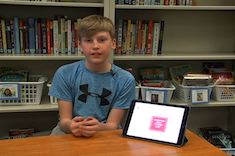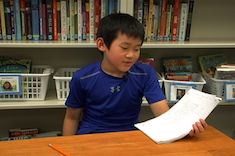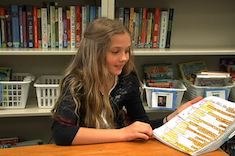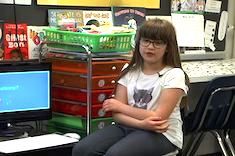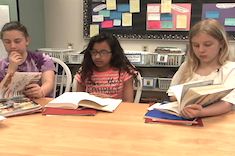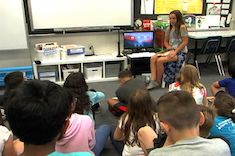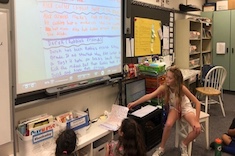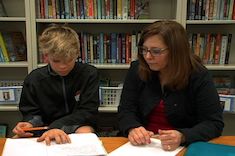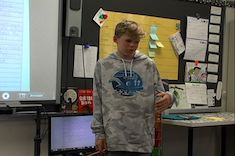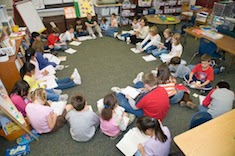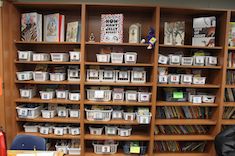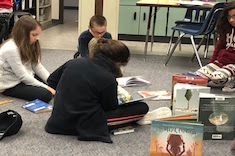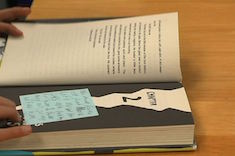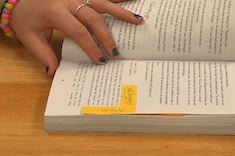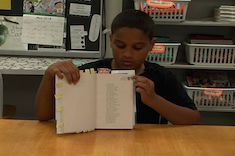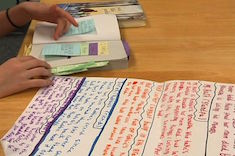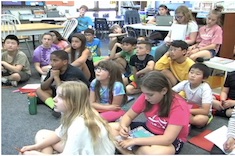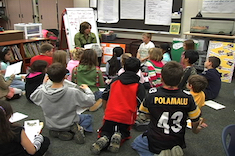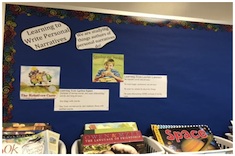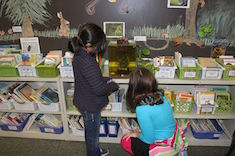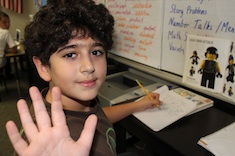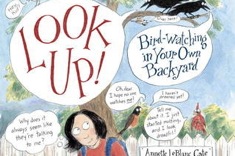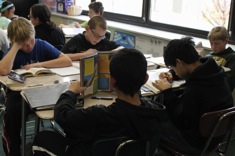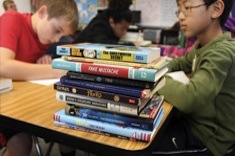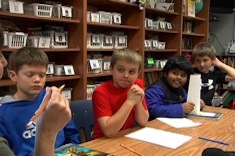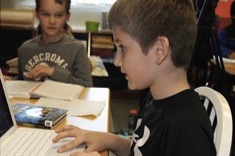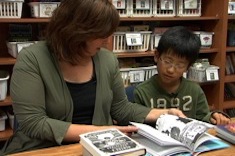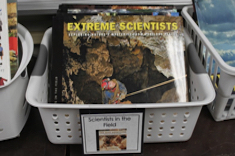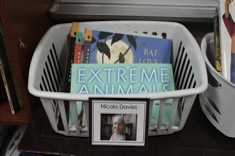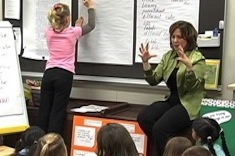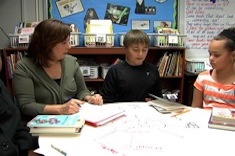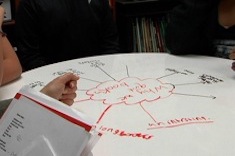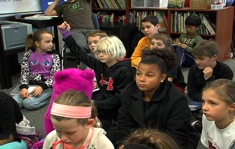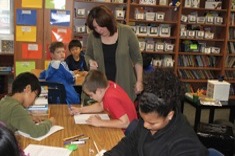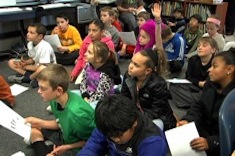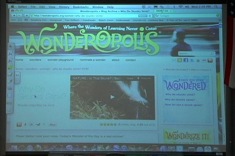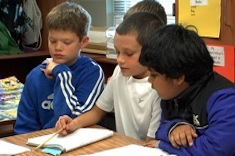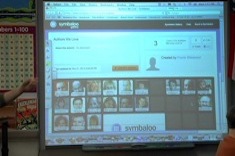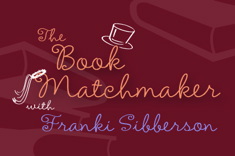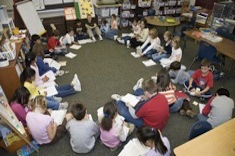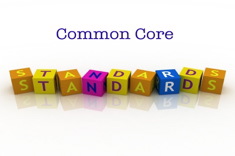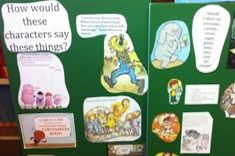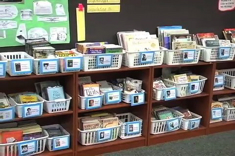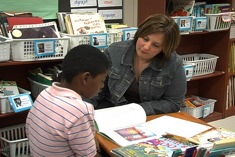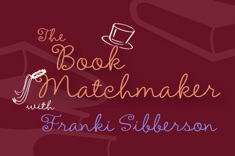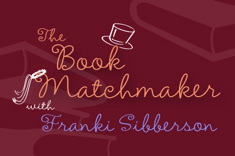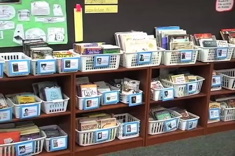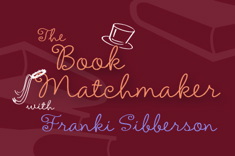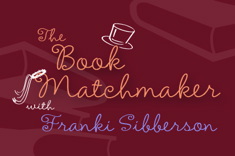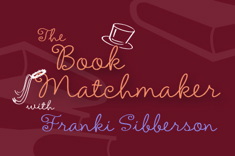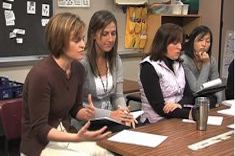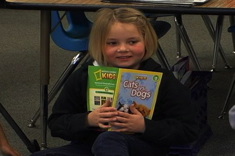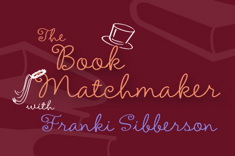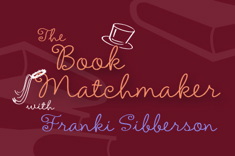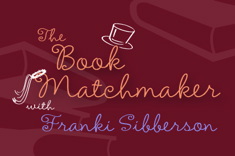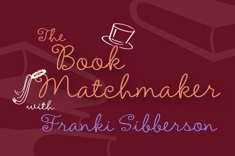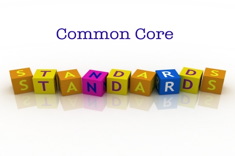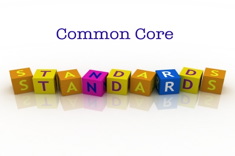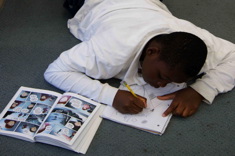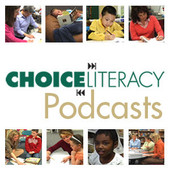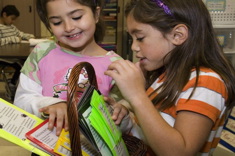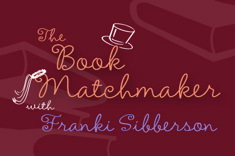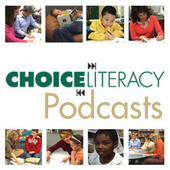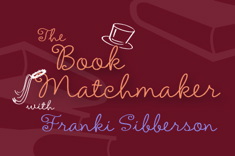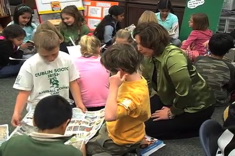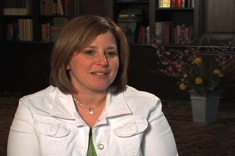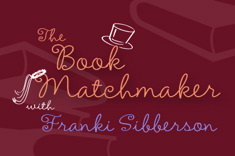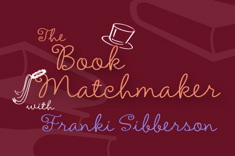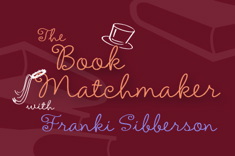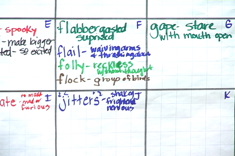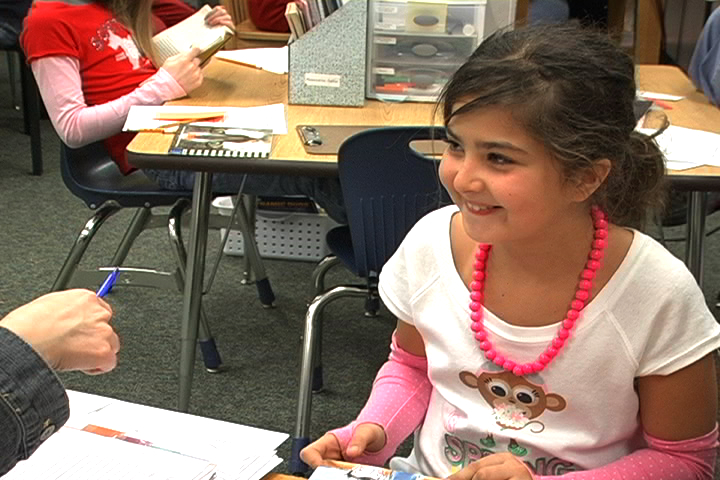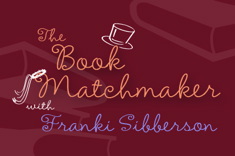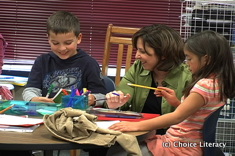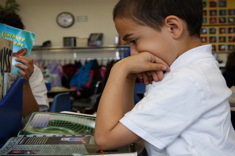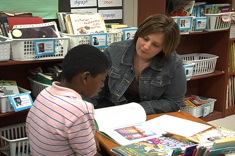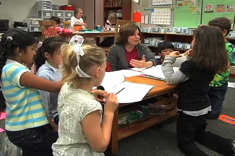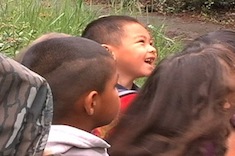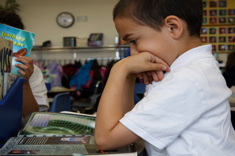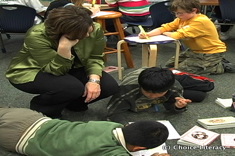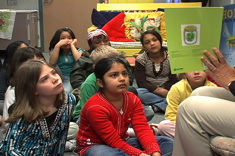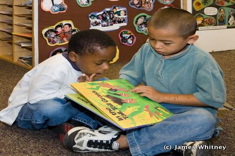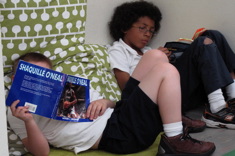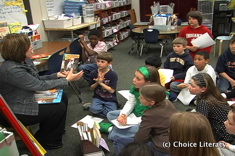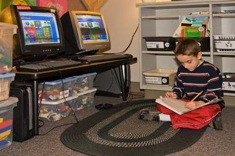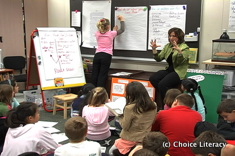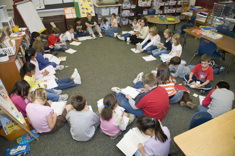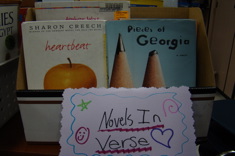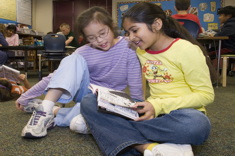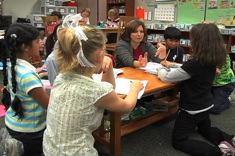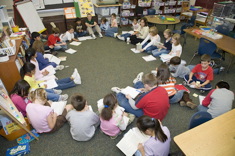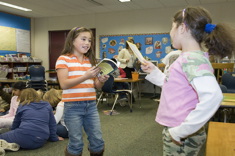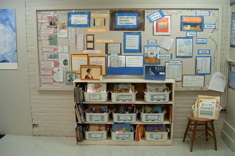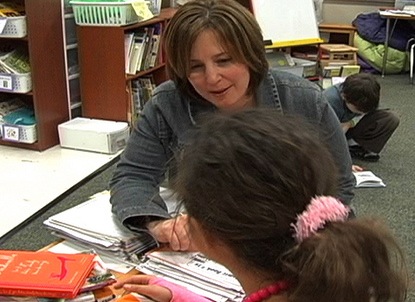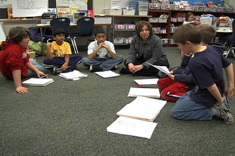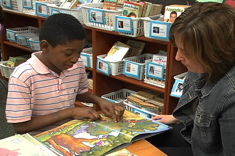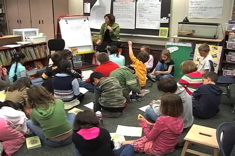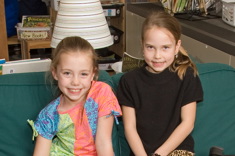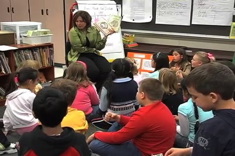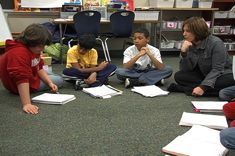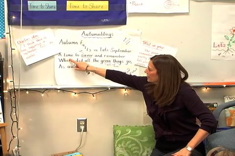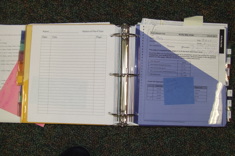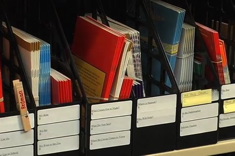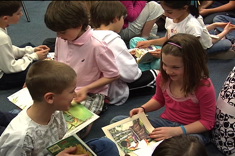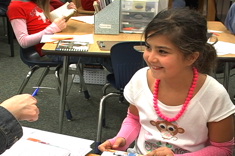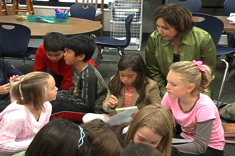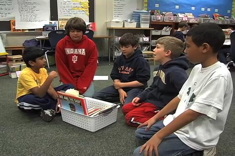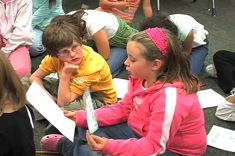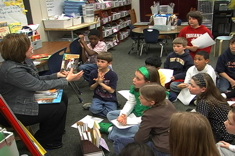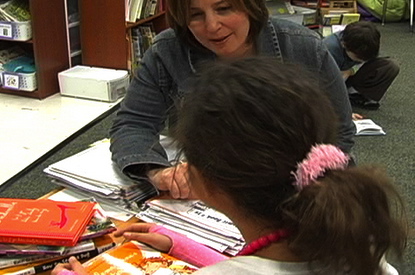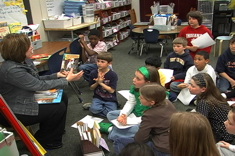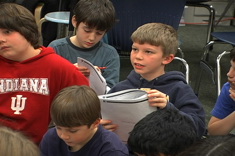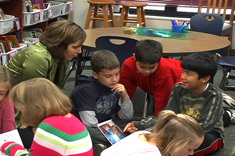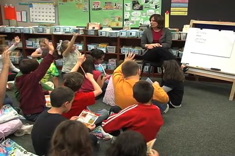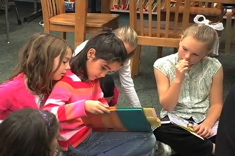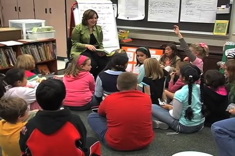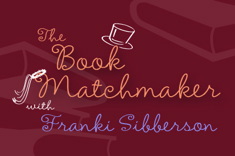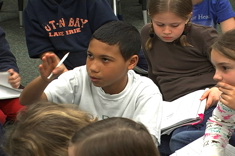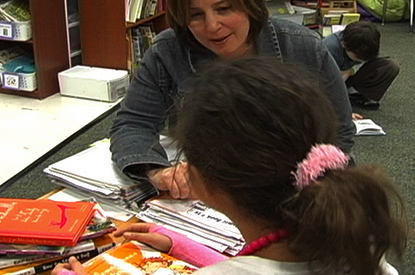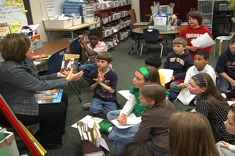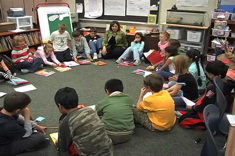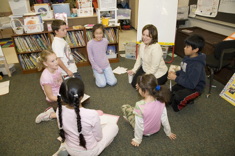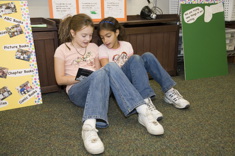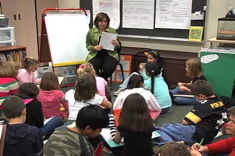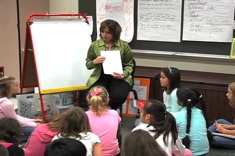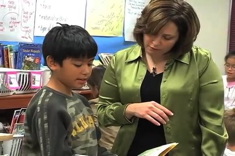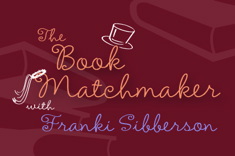Franki Sibberson
Franki Sibberson has worked for over 30 years as a teacher at different grade levels, school librarian, and literacy coach. Her writing and video work as a lead contributor for Choice Literacy keeps us updated on the latest and greatest books as well as practical “how-tos” on assessment, comprehension, word work, technology and more. Franki is the co-author of many books and videos on teaching reading in the intermediate grades, including Beyond Leveled Books, Still Learning to Read, Day-to-Day Assessment in the Reading Workshop, and Digital Reading: What’s Essential in Grades 3-8. You can keep up with Franki on the popular blog she writes with Mary Lee Hahn, A Year of Reading. Franki is currently the president of NCTE.
Latest Content
Writing Partner Feedback in Fifth Grade
Fifth-grade writers in Franki Sibberson’s classroom encourage each other and suggest revisions to their opinion-writing drafts in partner teams.
Text Sets: Reading Beyond Just Facts
Franki Sibberson explains how carefully curated text sets can help students move beyond a “just the facts” exploration of nonfiction topics.
Do Students Need to Love the Books We Read Aloud?
Franki Sibberson asks a critical question: Do students need to love the read alouds we share in classrooms? She works to move students beyond shallow like/don’t like responses to books.
Status of the Class: Reflecting on Reading Communities
Franki Sibberson uses status of the class each day as a window into her fledgling reading community.
Read-Aloud Annotations: Google Slides
In this video series, Franki Sibberson’s fifth graders share their strategies for annotating the class read aloud. In this installment, Antonio shares his Google Slides.
Read-Aloud Annotations: Google Docs for Questions
In this video series, Franki Sibberson’s fifth graders share their strategies for annotating the class read-aloud. In this installment, Lauren uses Google Docs to record questions to explore as she listens.
Read-Aloud Annotations: Expectation and Reality
In this video series, Franki Sibberson’s fifth graders share their strategies for annotating the class read-aloud. In this installment, Lizzie uses her notebook to focus on expectations and reality for characters, especially when it comes to stereotypes.
Read Aloud Annotations: Using Google Slides to Focus
In this video series, Franki Sibberson’s fifth graders share their strategies for annotating the class read-aloud, In this installment, Reagan uses Google Slides to focus her thoughts and analyze different characters.
Read-Aloud Annotations: Thoughts to Themes
In this video series, Franki Sibberson’s fifth graders share their strategies for annotating the class read-aloud. In this installment, Stone uses Google Slides to record thoughts and tease out themes.
Read Aloud Annotations: Predictions
In this video series, Franki Sibberson’s fifth graders share their strategies for annotating the class read aloud. In this installment, Sharvari uses Google Slides with text boxes to record predictions and thinking.
Read Aloud Annotations: Characters and Intentions
In this video series, Franki Sibberson’s fifth graders share their strategies for annotating the class read aloud The Girl Who Drank the Moon. In this installment, Ben creates a graph in his notebook to record characters and intentions that are emerging in the story.
Read-Aloud Annotations: Notebook Predictions
In this video series, Franki Sibberson’s fifth graders share their strategies for annotating the class read aloud, The Girl Who Drank the Moon. Students have their choice of using notebooks or tech devices, and can pick any strategy that helps them make sense of the story. In this installment, Hannah shares her notebook where she highlights the setting and characters, as well as makes predictions.
Student-Led Minilession: Planning and Organizing Nonfiction Writing
Katie presents a student-led minilesson in Franki Sibberson’s fifth-grade class on organizing and planning nonfiction writing.
Digital and Disney: Conferring with Ben
It would be easy to zip quickly through a writing conference about a vacation story, especially one about a trip to Disney. In this video, Franki Sibberson slows down with Ben to explore how he is meeting his goal of adding descriptive language to writing, using digital tools to assist.
A Minilesson on Minilessons
Franki Sibberson leads a minilesson in her fifth-grade classroom to help students design their own lessons. Students also assess what goes into a high-quality minilesson.
Small Group: Creativity
Franki Sibberson pulls together a group of fifth graders to explore writing mentors together.
Student-Led Minilesson: Annotating Reading with Sticky Notes
Students can claim who they are as readers and writers by designing and presenting minilessons to their peers. In this week’s video, fifth grader Reagan from Franki Sibberson’s classroom presents a lesson on annotating reading with sticky notes.
Thoughtful Read Aloud Structures
Franki Sibberson shares how she integrates student choice and collaboration into reading response during daily read alouds.
Student-Led Minilessons in Fifth Grade
Franki Sibberson initiates student-led minilessons, and finds the process takes her literacy workshops to a new level of independence and energy.
Planning a Student-Led Minilesson
Franki Sibberson helps Lucas plan his minilesson for his fifth-grade classmates on how to connect words and facts from two different sources.
Student-Led Minilesson: Connecting Facts from Different Sources
Lucas leads a minilesson in Franki Sibberson’s fifth-grade class on connecting facts from different sources.
Annotating While Reading
Franki Sibberson finds teaching students to annotate while reading is one of the best ways to promote ongoing reflective response in her fifth-grade classroom. She shares how she starts teaching annotation skills early in the year.
Keeping the Classroom Library Current
Franki Sibberson explains how she watches students closely and adjusts her library based on what she sees all year long.
Invitations vs. Accountability
It’s not an invitation if students are required to accept it. Franki Sibberson explains how engagement depends upon true choice and lots of options in her fifth-grade classroom.
Student Notes: Slow Down and Think
Fifth grader Orion uses sticky notes to make questions and predictions at the end of each chapter.
Student Notes: Reading for Writing
Reagan, a fifth grader in Franki Sibberson's class, explains how she uses sticky notes to flag examples of writer's craft she could use in her own writing.
Student Notes: Reminders for Later
We continue our video series from Franki Sibberson's class of fifth graders explaining how they take notes while reading. Sarah marks important elements early in the mystery she is reading, so she can easily refer to them later.
Student Notes: Keeping Track of Many Characters
Tre uses lots of sticky notes to sort through and keep track of characters in a book with a whole classroom full of personalities.
Student Notes: Experimenting with Two Strategies
What do student notes from independent reading look like when students have free choice? In this video series, fifth graders from Franki Sibberson's class explain their notetaking strategies. We start with Ally, who tries out two different strategies to figure out which one will help her the most.
Leads Minilesson
This fifth-grade minilesson from Franki Sibberson is a lovely mix of mentor texts, Franki's own writing, and honesty about the writing process.
More Nonfiction Read Alouds
Franki Sibberson shares strategies for incorporating more nonfiction into read-aloud times throughout the day.
Planning for a Narrative Writing Unit of Study
Franki Sibberson believes planning a unit of study should be just as much fun as planning a trip to Disney World. She explains her planning process for one of her first units of study, on narrative writing.
The Benefits of #bookaday
Franki Sibberson finds the investment of five to seven minutes a day for #bookaday with her third graders is truly time well spent.
Teaching Students How to Give Revision Suggestions
Franki Sibberson shares a lesson progression to help students learn how to give helpful revision feedback. She uses online videos and resources to support her work.
The Craft of Blogging
Franki Sibberson uses a micro-progression of her own draft of a blog post to help her third graders improve their blogging skills.
Student-Led Conferences from Many Perspectives
Jennifer Schwanke and Franki Sibberson share four perspectives on student-led conferences — teacher, principal, student, and parent.
Bad Days in Workshops
Franki Sibberson realizes there are some bad days in literacy workshops that hold no great life lessons for teachers and students, and that is okay.
Embracing the Books My Students Love
Franki Sibberson explains why we need to move beyond our cherished definitions of quality when working with third graders in transition and embrace the books students love.
Nonfiction Books with More Than One Entry Point
Franki Sibberson shares some of her favorite nonfiction books with more than one entry point.
Beyond Explicit Instruction: What Do Struggling Readers Need?
Franki Sibberson explores the varied needs of young readers and writers.
More Than Dr. Seuss Hats: Why Events Matter
Franki Sibberson explains how scheduling big events can do important work in building the reading community.
Making Time for Individual Conferences
Franki Sibberson explains how longer conferences early in the year pay dividends all year long.
Shallow Books? Learning from a Reading Celebration
Franki Sibberson discovers we allow students to assess what reading matters most to them, we can learn a remarkable amount.
“Lift a Line” Boys Reading Group
Franki Sibberson gives a group of boys a “lift a line” assignment to build their close reading skills.
Jumping Off the Buzz Wagon: The Value of Reading Logs
Are you ready to ditch your reading logs? Not so fast. Franki Sibberson explains why she still uses them in her third-grade classroom.
Reader Response in the Digital Age
Franki Sibberson has suggestions for moving to more digital response options with students.
“I Used To, and Now I”: An Early Year Minilesson
Franki Sibberson finds an “I Used to and Now I” format helps her third-grade students understand how technology is changing reading habits.
Getting Ready for Summer Reading: A Lesson Cycle
Franki Sibberson designs a lesson cycle to prepare students for summer reading.
More Sophisticated Mysteries: Conferring with Yuki
Franki Sibberson confers with fourth grader Yuki to expand his reading options into more complex series and mysteries.
Rethinking Nonfiction Topic-Based Text Sets
Franki Sibberson concludes her series on redesigning nonfiction sections of classroom libraries in the age of the Common Core.
Rethinking Nonfiction Series Books
Franki Sibberson explains how she features nonfiction series books in her classroom library.
Rethinking Nonfiction Author Baskets
Franki Sibberson realizes she needs to highlight nonfiction authors in new ways in her classroom library.
Curating a Nonfiction Classroom Library
Franki Sibberson writes about how her thinking about nonfiction is changing her classroom library in this first installment of a four-part series.
Kindle Highlights: Conferring with Nicole
If you’ve ever used a Kindle reader, you might be fascinated by the highlighted notes of other readers. Franki Sibberson uses those notes in a conference with Nicole.
Two Lessons for Teaching Theme
Franki Sibberson writes about how she chooses books for theme instruction and shares two lessons.
Strong Girls Book Group
Franki Sibberson shares a range of books that include compelling female characters with a group of fourth-grade girls.
Building Stamina and Book Choice Skills
Franki Sibberson continues a discussion with a small group of students who often abandon books. This is the second installment in a two-part video series.
Abandoning Books Discussion
Franki Sibberson works with a small group of fourth graders who often abandon books.
Using Pinterest for Professional Development
Franki Sibberson finds Pinterest is a useful tool for professional development.
Fourth Grade Writing Workshop Minilesson on Focusing
Franki Sibberson shares some tips and strategies with her fourth graders from the web for focusing and organizing their writing.
Rethinking the Assessment Binder
Franki Sibberson’s dilemma? How to file every evaluation so it is organized and accessible (since she never knows when someone might ask for it), while still finding a way to keep the assessments she needs every day at her fingertips.
Whole Group Writing Share
Franki Sibberson’s fourth graders use the whole-class writing share time to discuss writing series they are working on (including blog interviews and book reviews), with an eye toward collaborating with classmates.
Conferring with Ben
Franki Sibberson confers with Ben, a fourth-grade writer trying to figure out the best audience for his writing when technology presents many options.
Conferring with Pierce
Franki Sibberson demonstrates how much ground can be covered in a three-minute conference with a student. She helps fourth grader Pierce think through the audience for his writing, how to add visuals to blog posts, and enlists him to teach others new skills as he acquires them.
The Lunch Lady and Gender in Reading
Franki Sibberson has her students read a blog post about books written for boys and girls, which begins a fascinating discussion with the class about gender in reading choices.
10 Principles for Planning Reading Minilessons
Franki Sibberson shares 10 principles for minilesson planning. This is an excerpt from her new book, The Joy of Planning.
Beyond Text Features in Nonfiction Instruction
Franki Sibberson considers how the demands of the Common Core and the complex mix of online and offline nonfiction texts are changing the skills she teaches students.
Science Challenge
Franki Sibberson’s fourth-grade students share results from the weekly science challenge.
Getting More from Wonderopolis
Franki Sibberson uses Wonderopolis with her 4th grade students, helping them learn to research and dig more deeply at the site.
Lists, Facts, and Reports: Conferring with Anna
Franki Sibberson confers with fourth grader Anna to help her connect report writing with her love of animal lists.
Brainstorming Student Blogs
Franki Sibberson works with a group of students who want to create a collaborative blog of interviews. The discussion reveals some of the challenges of blog writing, including consistent posting and developing topics that might endure over time.
Helping Students Develop Independent Previewing Skills
Franki Sibberson's goal is to provide her students with more tools for previewing books independently and making wise selections. In this lesson, she makes full use of technology to set up sites and resources for students to browse at school or home.
Book Matchmaker: Nonfiction to Read Cover to Cover
With the Common Core emphasis on nonfiction, teachers are striving to integrate more nonfiction texts throughout their literacy workshops. Franki Sibberson shares her favorite nonfiction texts that can be read cover to cover.
Previewing a Read Aloud
Franki Sibberson previews a read aloud with her grades 3 and 4 students.
Book Matchmaker: Fairy Tales for Older Readers
Renew older students' interest in fantasy and fairy tales with these suggestions of recent titles from Franki Sibberson.
Common Core Booklist: Writing Personal Narratives
Personal narratives are an important part of the Common Core in 4th grade. Franki Sibberson shares a booklist of some of her favorite mentor texts for teaching narratives in the intermediate grades.
Book Matchmaker: Read Aloud Versions of Old Favorites
Franki Sibberson presents some delightful versions of classic tales perfect for read alouds with youngsters.
Ten Classic Ideas That Still Work
Teachers are always on the hunt for something new, even as we cherish what works well year after year. Franki Sibberson lists the activities that have stood the test of time in her classroom.
Chronology in Nonfiction (Common Core Booklist)
Franki Sibberson's latest Common Core booklist includes texts to help students master chronology in nonfiction.
Walls, Displays, and Invitations Early in the School Year
Franki Sibberson turns to museums for inspiration as she designs wall displays for the start of the school year.
The Quest for the Perfect First Read Aloud of the Year
Franki Sibberson is on a quest to find the perfect first read aloud of the year, and the search helps her consider the goals and purpose of read alouds during the first days of school.
Rethinking My Nonfiction Library in Response to the Common Core
Franki Sibberson finds a new classroom, the Common Core, and tech considerations are changing the ways she organizes the nonfiction sections of her classroom library.
Book Matchmaker: Read Alouds for 1st Grade
Franki Sibberson helps a 1st grade teacher select read alouds for her class in this installment of Book Matchmaker.
Grades 3&4 Room Tour
In this video tour, Franki Sibberson narrates a description of the grades 3&4 multiage classroom she shares with a colleague. The space is small, so Franki explains how storage areas are carefully arranged and seating is creatively designed to make the most of limited space.
Next-Read Stack: Conferring for Independence
Franki Sibberson explains the value of "Next-Read Stack" conferences for fostering independence, and includes a video example.
Book Matchmaker: Texts for Young English Language Learners
Franki Sibberson shares some of her favorite new titles for young English language learners.
Book Matchmaker: “Cool” Books for a Struggling Second Grader
Franki Sibberson selects some “cool” books for a struggling reader who wants to fit in with his 2nd grade peers.
If You Like Junie B. Jones, You Might Like . . .
What young learner doesn’t love Junie B. Jones? Franki Sibberson shares great texts to recommend for readers who adore Junie and might be looking for similar characters and plots.
Book Matchmaker: Global Citizenship and Social Responsibility
Here are some newer books for teaching students about social responsibility and what it means to be a citizen of the world.
Book Matchmaker: Wordless Picture Books
Brad Smedley, an elementary principal, is looking for wordless picture books to share with his preschool classes.
Poetry that Celebrates Summertime and the Outdoors
Franki Sibberson combines verse and nature in this booklist on taking poetry outdoors.
Book Matchmaker: Picture Book Biographies
Franki Sibberson shares some of her favorite picture book biographies in the latest installment of Book Matchmaker.
Literacy Team Meeting: Focus on Word Work Part 2
In the second part of the literacy team meeting, teachers on the team move from the focus on sharing, to the important phase of where to go next as a team and as a school. Because the crucial work of the team is the work done between meetings, this is a critical discussion.
Previewing Nonfiction
Teachers are adding more nonfiction to their classroom libraries, and looking for ways to promote nonfiction with students in light of the emphasis on nonfiction in the Common Core. Franki Sibberson share tips for previewing nonfiction with students.
Book Matchmaker: Teaching Theme in the Intermediate Grades
Students need strong mentor texts for understanding the concept of theme. Franki Sibberson shares many of her favorites in this Book Matchmaker.
Book Matchmaker: Texts for an Advanced First Grader
Joan is a first-grade teacher who has one reader in mind – a student who is reading well above grade-level expectations. Franki Sibberson has many intriguing book suggestions to help her.
Book Matchmaker: Intermediate Read-Alouds
Franki Sibberson shares some of her favorite read-alouds for the intermediate grades.
Book Matchmaker: Graphic Novels for a 6th Grader
Franki Sibberson has graphic novel suggestions for 6th grade girls.
Book Matchmaker: 5th Grade English Language Learners
Robin Heist is an elementary teacher looking for books for her older English language learners who are reading below grade-level expectations.
Unpacking the Common Core Standards: Compare and Contrast Nonfiction
Franki Sibberson highlights texts for teaching compare and contrast in nonfiction texts.
Unpacking the Common Core Standards: First Grade Information Texts
Franki Sibberson designs a booklist for tackling information texts in first grade.
The Power of Games for 21st Century Learners
Franki Sibberson explains how low-tech board games can be a powerful tool for developing skills that will be in high demand in the coming years.
If You Like Goosebumps . . .
Students still love the Goosebumps series, and teachers can build on that passion by introducing them to other texts with similar appeal. Franki Sibberson shares books at a variety of reading levels which tap into student fascination with things that go bump in the night.
Perspective as a Component of Text Complexity: A Common Core Booklist
Franki Sibberson tackles the connections between text complexity and perspective in this Common Core booklist.
Beyond Harry Potter: Tapping Student Interest in Fantasy
Franki Sibberson taps into the fantasy craze among students with this booklist.
Mentor Texts for a Writing Study in Graphica
Graphica readers often want to become graphica writers. Franki Sibberson weeds through the books and leaves us with the "good stuff" for mentor texts.
Learning from Master Teachers: It’s the Process, Not the Content (Part I)
Have you ever wondered why lessons you attempt to imitate from master teachers you’ve seen on videos often go poorly? Franki Sibberson asked herself this question after trying a minilesson she viewed from Debbie Miller. She discovered it’s what comes before the lesson that matters more than what’s in the lesson.
Learning from Master Teachers: Final Lessons in the Cycle (Part II)
Franki Sibberson presents two more minilessons from her cycle on teaching students how to respond to reading.
Donalyn Miller on Engaging Readers (PODCAST)
In this podcast, Franki Sibberson chats with Donalyn Miller about how she defines “engaged” reading, and the teacher’s role in motivating readers.
Books that Invite Students into Poetry Writing
Are your students stuck on writing poems that rhyme? Franki Sibberson shares some of her favorite mentor texts for lifting the quality of student poems.
New Books to Celebrate Poetry
Franki Sibberson shares some of her favorite new poetry collections in an annotated booklist.
Ways to Collaborate With Your School Librarian
Teachers and school librarians would often love to collaborate more, but time is limited. After working for years as both a classroom teacher and school librarian, Franki Sibberson writes from experience as she shares practical suggestions for collaborating with school librarians.
Book Matchmaker: Texts for 5th Grade English Language Learners
Finding high interest books for English language learners in the upper elementary grades can be a challenge. Franki Sibberson shares some of her favorites.
Getting Started With Twitter
Intrigue, frustration, instruction at the point of need…Franki Sibberson cycles through many common learning stages as she builds Twitter into her daily routine.
Updating Reading Interviews: Technology and Changing Habits
Reading Interviews are a staple in many literacy programs – a terrific tool for learning more about the history and habits of students. Franki Sibberson explains how she has updated her reading interview to include questions about digital resources and tools.
Patrick Allen on Conferring (PODCAST)
Patrick Allen talks about the value of conferring, and what he does to build his conferring skills.
5 Easy Steps to Becoming Active in the Blog Community
If you are beginning to involve yourself more in online networks, you might enjoy these suggestions from Mary Lee Hahn and Franki Sibberson.
Books to Celebrate Earth Day
Earth Day in April is a great time to get outdoors with a good book! Franki Sibberson shares some of her favorite texts linked to Earth Day.
Book Matchmaker: Texts to Inspire Our Youngest Readers and Writers
In this installment of the Book Matchmaker series with Franki Sibberson, Franki helps first-grade teacher Danielle think through what books might spark better writing in her young students who are mostly interested in toys and video games.
Book Matchmaker: New Books for Intermediate Readers
From humor to novels in verse, Franki Sibberson shares her top picks for intermediate readers in this Book Matchmaker.
Book Matchmaker: A Friendship Theme for Literature Circles
Franki Sibberson shares her top picks for literacy circles with a friendship theme. This is an excellent theme for building community any time of year.
Using Comics in Literacy Workshops
Franki Sibberson works with her 3rd and 4th graders to use comics in the literacy workshop.
Quick Takes: Advice on Book Hogs
In this quick take video, Franki Sibberson gives advice for dealing with "book hogs" — those students who try to grab any new book when it appears in the classroom library.
Book Matchmaker: Texts to Build Stamina
In this installment of Book Matchmaker, Franki Sibberson has suggestions for books to build reading stamina in students.
Book Matchmaker: Teaching Inferring to Intermediate Students
In this installment of Book Matchmaker, Franki Sibberson discusses the challenges of finding a range of books to teach the concept of inferring to grades 3-5 students.
Book Matchmaker: Characters Across the Grades
In this installment of Book Matchmaker, Franki Sibberson provides a range of books for teaching character development in fiction for grades 3-5 students.
Book Matchmaker: Teaching Point of View
In this installment of Book Matchmaker, Franki Sibberson provides a range of books for teaching point of view for grades 3-5 students.
Book Matchmaker: Short Vowel Practice with Older Students
In this installment of Book Matchmaker, Franki Sibberson tackles the tough question of how to find texts for students who need help with short vowels, but are too old to enjoy many primary texts.
Similes, Metaphors, Homophones and Synonyms: Children’s Books to Teach the Language of Words
Here are some delightful picture books to teach how similes, metaphors, homophones and synonyms work.
Using Picture Books to Spice Up Vocabulary Instruction (BOOKLIST)
Picture books are a terrific tool for vocabulary instruction – students have so much fun reading them they are hardly aware of all the new words they are picking up. Franki Sibberson shares her top picks for spicing up vocabulary instruction in this booklist.
Revising Titles Minilesson
In this minilesson from Franki Sibberson’s grades 3 and 4 classroom, Franki takes students through the process of selecting and revising titles. She uses the poem “Confessions of a Reader” by Carol Wilcox as a mentor text.
Closing Out the Library: Cleaning Up and Thinking Ahead
Franki Sibberson provides a series of questions to help you focus on what students need in classroom and school libraries, as well as how those needs might be changing.
Book Matchmaker: Helping a Struggling Reader in 5th Grade
In this installment of Book Matchmaker, Franki Sibberson shares books and genres a struggling 5th grader might enjoy.
5 Easy Steps for Starting a Blog
Mary Lee Hahn and Franki Sibberson share tips for launching and maintaining a blog, as well as a wealth of reasons why it’s a valuable use of your time
Using Picture Books to Teach Theme in Grades 3-6
Many students in the upper elementary and middle school grades shun all picture books, yet they are an invaluable resource for teaching sophisticated literacy concepts. Franki Sibberson explains how to teach the concept of theme using picture books in this booklist.
Rethinking the Study of Nonfiction in the 21st Century
Franki Sibberson reflects on her nonfiction writing unit, and realizes she emphasizes research skills at the expense of the craft of nonfiction writing. She explains how she revamps the unit to help students focus more on writer's craft in nonfiction texts, including some new mentor texts and different ways of using writer's notebooks.
What Messages Do We Give Students with Our Classroom Library Design?
Franki Sibberson describes how the topics and arrangements of baskets in the classroom library give strong messages about reading to students.
Using Student Conferences to Build Book Choice Skills
Franki Sibberson provides focus questions and a template to help choose books with students for independent reading.
When Does Level Matter? Being Efficient with Small Group Instruction
When does level matter in grouping students for reading instruction?  Franki Sibberson shares her latest thinking and a template to use in organizing groups.
Making a Difference: Examples from Children’s Literature (BOOKLIST)
Spring is a time in many schools for volunteer work and community service projects. This booklist will inspire your students.
Addicted to Twitter: How Did It Happen?
Franki Sibberson documents the stages of tweetage, from avoidance to addiction.
Great Nonfiction for Elementary Students
As the quality of nonfiction for students has grown, so have our expectations for using these books with students. Franki Sibberson's presents texts that can help students move beyond "skimming and scanning," and into more in-depth reading.
Teaching Reading Skills with Wordless Picture Books
Franki Sibberson shares some of her favorite wordless picture books for teaching reading skills.
Mentor Texts for Word Choice (BOOKLIST)
Choosing words in writing is a key to effectively communicating ideas. Franki Sibberson finds that the best way to introduce and extend conversations about words is through the use of picture books.
Books That Invite Thoughtful Conversation in Grades K-2
Nothing beats an engaging and fun text to spark conversations among young children. Here are some suggestions of terrific read-alouds to get the chatter started in classrooms.
Not Available in a Six-Pack: Books to Place Alongside Leveled Texts for Our Youngest Readers
Teachers of young children often face the difficult choice of using leveled books that aren't necessarily engaging, or children's literature that isn't as easy to peg for readability. Franki Sibberson is on the hunt for wonderful children's literature that can easilysupplement or replace those lowest level "six-packs" of texts.
Books That Invite Conversations About Perspective (BOOKLIST)
Students need to understand perspective (or point of view) if they want to comprehend what motivates a character. In this booklist, Franki Sibberson highlights some terrific children's literature for helping students grasp the concept of perspective.
Literacy Learning on Presidents Day (BOOKLIST)
Here are some books to spice up your teaching in February on Presidents Day, or any time U.S. presidents come up in your curriculum.
Biographies Off the Beaten Path
Here are some quirky biographies that will inspire and delight your students.
Character Study in Grades 3-6
A character study unit is a terrific choice early in the school year, since it taps into students' reading histories and favorites from years past. Franki Sibberson has suggestions of books and questions for use in read-alouds.
Using Summer Reading to Expand the Whole School Reading Community
What big messages do we give to students with summer reading assignments? Franki Sibberson considers this question and shares the template she sends home with children of all ages.
The Reading Skills We Use When Searching the Internet
Browsing and previewing skills change when the medium is the Internet. Franki Sibberson has advice for working with tech-savvy young readers.
Expanding the Ways We Preview Books
Franki Sibberson discovers new ways technology can expand and enrich how students preview books.
Books to Get Us Ready for Summer Vacation
Franki Sibberson finds preparing students for summer reading is a little different this year, now that she has moved from classroom teaching to work in the school library. Here are some terrific books to get students excited about summer.
Reflections on Our Year of Read Alouds (BOOKLIST)
if you're moving from thinking about read alouds for the first days of school, to plotting out a plan for read alouds all year long, you might want to read Franki Sibberson's booklist of read-alouds used for the entire year with her 3rd and 4th grade students.
Novels in Verse (BOOKLIST)
Franki Sibberson provides a booklist of "novels in verse" – a genre intermediate readers enjoy, especially those who struggle with longer texts.
Just Because It’s Skinny, Doesn’t Mean It’s Easy: Matching Books to Transitional Readers in Grades 2-4
Franki Sibberson writes about her evolution in choosing books for transitional readers in grades 2-4. Franki includes a handy list of criteria for evaluating whether new short chapter books are appropriate for young readers.
If You Like Captain Underpants: Related Books for Students (BOOKLIST)
Franki Sibberson has suggestions for sustaining the interest of kids who love silly and gross fun in this booklist.
Fairy Tales for Middle Grade Readers (BOOKLIST)
This booklist is on fairytales, and there are a range of reading levels and styles to support readers of different ability levels.
Easing into Assessments During the First Six Weeks of School
Franki Sibberson and Karen Szymusiak have suggestions for integrating observations and assessments of students naturally into reader's workshops during the first six weeks of school.
Sharing Our Lives as Readers with Our Students
Students look to us as model readers. Franki Sibberson explains how a quick explanation of your habits and preferences can be a wonderful start to year-long conversations.
How Can School and Classroom Libraries Support Struggling Readers?
Franki Sibberson tries to imagine what school and classroom libraries look like to struggling readers who are gazing at scores of books beyond their reading levels.
A Workshop Model in the Library: Time for More Than Book Checkout
Franki Sibberson shares ideas for library browsing baskets, as well as ways to integrate minilessons into the school library routine.
New Versions of Old Favorites (BOOKLIST)
Recently there has been less interest in retelling of classic tales by children’s book authors. Franki Sibberson’s booklist highlights some of the best new twists on favorite children’s stories.
Build Fluency with Books That Are Fun for Kids to Read Aloud Over and Over and Over Again
Here’s a booklist of delightful titles that will build fluency skills for students — both as read alouds, and during independent reading.
Books that Invite Student Participation
Franki Sibberson has suggestions for read-alouds that encourage kids to participate.
Making Time for Nonfiction Read Alouds
Franki Sibberson considers the issue of selecting nonfiction books for read-aloud time, and in doing so creates one of her popular booklists.
Characters We Love (BOOKLIST)
Nothing hooks kids on books more than a favorite character. Franki Sibberson presents some series books with intriguing characters that will delight your students.
Rethinking a Study of Nonfiction Writing
Franki Sibberson reflects on her nonfiction writing unit, and realizes she emphasizes research skills at the expense of the craft of nonfiction writing.
If Boot Camp Was Standards-Based
Franki Sibberson's article this winter linking her learning from fitness boot camp to working with struggling readers was one of our most popular features ever. Here she provides a follow-up to share new lessons from bootcamp in a standards-based world.
Making Time for Literacy Chitchat to Support Book Choice
Franki Sibberson shares ways to initiate conversations about books naturally in classrooms. The feature includes a question set for launching discussions about books with individual students.
Aligning Curriculum with Struggling Readers in Mind
This is a terrific article for a team considering struggling learners to read together and discuss. Franki Sibberson asks some critical questions, including how many transitions and different adults some children work with each day in the name of getting all the support they need.
Knitting, Independence, and Small Group Routines for Intermediate Readers
Franki Sibberson uses a knitting analogy to reflect upon alternatives to guided reading in the intermediate grades that promote more student independence.
Student Independence and Ownership in the Library
The “status of the class” form is a tool used by many teachers in reading and writing workshops to chart student plans daily. As Franki Sibberson tests out a status form in the school library, she discovers it has more value than she realized.
The Luxury of Extra Reading Time Over the Holidays
Franki Sibberson finds the days before holiday break are the perfect time for talking through with students how to make pleasure reading choices. Her feature includes a template to help students organize and think through their preferences.
Nonfiction Books for Independent Reading: Moving Beyond Content Connections (BOOKLIST)
Franki Sibberson explains how she boosted the amount of nonfiction texts her grades 4 and 5 students were choosing for independent reading by focusing more on interest than on content connections.
Literary Nonfiction: Models for Writing
Literary nonfiction is emerging as a popular genre. In this booklist, Franki Sibberson shares mentor texts for writing literary nonfiction.
Reflecting on the First Six Weeks of Word Study
Franki Sibberson explains how she rethought word study during the first six weeks of school, giving manypractical examples of activities and routines with her intermediate students.
Strong Girls (BOOKLIST)
If Nancy Drew was an important literary role model for you when you were a preteen, you might enjoy a peek at the sassy new gals who are influencing our tweens.
Short Units, Big Messages
Those "in-between" writers in grades 3 and 4 present special challenges to teachers. Some are fluent and versatile, writing page after page of drafts. Other students struggle to craft even a sentence. Franki Sibberson explains how short texts and brief genre units can help intermediate writers with a wide range of abilities.
Staying True to Our Beliefs When Working With Struggling Readers and Writers in Grades 3-6
Franki Sibberson writes about the challenges of holding true to our beliefs in working with struggling readers, and shares the questions she asks herself as a way of self-monitoring her teaching with strugglers.
Enhance Your Classroom Poetry Collection
Franki Sibberson shares poetry collections that can do double and triple duty across the curriculum, and are favorites of her grades 3-4 students.
Fitness Boot Camp Helps Me Understand Struggling Readers
Franki Sibberson finishes 29th out of 30 participants in her fitness bootcamp mile run. In the process, she learns many lessons about herself and the needs of struggling learners in her classroom.
Beyond Matt Christopher (BOOKLIST)
Franki Sibberson finds many boys who are reluctant readers love the sports novels of Matt Christopher. So what is the logical next author or genre for these boys to keep them reading voraciously?
An Assessment Notebook That Works for Me
After lots of trial and error, Franki Sibberson finally has a format for her assessment notebook that works well.
Sales Clerks and Literacy Leaders
Franki Sibberson reflects on what makes a perfect salesperson . . .and literacy coach.
Helping Struggling Writers
How can we help students who are stuck when it comes time to write? Franki Sibberson shares a couple new strategies, including a book basket of texts selected by students themselves as useful for sparking writing topics in this photo essay.
Giving New Readers a Diet of More Than Leveled Books
Franki Sibberson contemplates which diet plan she’ll try this month, and that leads her to think about what a steady “diet” of leveled books does for young readers.
Where Have All the Picture Books Gone?
Franki Sibberson shares ways to foster continued enjoyment of picture books with intermediate readers, and highlights some texts with special appeal for older readers in this article which includes a booklist.
Preparing Students for Summer Reading
Franki Sibberson has some great suggestions for jumpstarting students’ summer reading. These ideas work if you are in the last week or two of school, or if you are just beginning a summer enrichment reading program with kids.
Helping Students Find Their Own Mentor Texts
Franki Sibberson helps her students learn how to evaluation and discover their own mentor texts in her grades 3 and 4 literacy workshops.
“If You Like Matt Christopher” Student Book Share
In this video from Franki Sibberson’s grades 3-4 classroom, boys share books that are similar to ones written by Matt Christopher.
Linking Math and Writing Through Word Problems
In this six-minute video, Franki Sibberson demonstrates how she helps her 3rd and 4th grade students make connections between writing workshop and math problem solving.
Supporting Thoughtful Book Choice
In this video filmed in the spring, Franki Sibberson helps her 3rd and 4th grade students think through what books they might select for independent reading.
Helping Young Readers Become Independent: The “Next-Read” Stack and Peer Groups
Franki Sibberson explains how "next-read" stack conferences work in her grades 3-4 classroom.
Helping Students Set Nonfiction Reading Goals
Franki Sibberson finds nonfiction reading goals elevate the value of nonfiction in her grades 3-4 classroom.
Talking About Tests
Franki Sibberson prepares her grades 3-4 students for state examinations by helping them observe attributes and patterns in test questions.
Book Choice and Planning Lesson
Franki Sibberson teaches her students about book choice in this video from her grades 3-4 classroom.
Nonfiction Word Hunt Part II
Franki Sibberson explains the value of the nonfiction word hunt activity.
Sports Writing Group Discussion
Franki Sibberson finds sports writing is a powerful motivator for boys in her grades 3-4 classroom.
Nonfiction Word Hunt Part I
Word study and nonfiction reading are combined in Franki Sibberson's nonfiction word hunt activity.
Crafting Characters in Writer’s Workshop
If you are looking for a “peppery” heroine, Mary from The Secret Garden is one for the ages. In this video of a lesson in writer’s workshop, Franki Sibberson shows how shared text can be used to help young writers understand character traits and development.
Book Matchmaker: Texts for “Outdoorsy” Boys
Those “outdoorsy” boys who love to fish and four-wheel all summer long can be a challenge to hook with books when they return to classrooms in the fall. This Book Matchmaker feature presents a video preview of new titles to entice these intermediate readers, as well as a print supplement of additional suggestions.
Fonts Lesson: A Revision Strategy for Transitional Writers
Franki Sibberson teaches a minilesson on fonts as a revision strategy for her grades 3 and 4 students.
Fonts: Small Group and Conferring with Intermediate Writers
In this follow-up to a whole class lesson and discussion of fonts, Franki Sibberson pulls together a group of 3rd and 4th graders from her class who have asked to be a part of a small group on fonts.
Shopping With Ana: Expanding Our Definition of “Just Right” Books in Grades K-2
Franki Sibberson learns from her daughter about emerging readers and book choice.
Revision Tools: Providing Options to Students
From old favorites like highlighters to new resources like kangaroo bags, this whole-class session with Franki Sibberson's grades 3-4 students highlights cool tools that will inspire learners to dive in and test out different revision strategies in writer's workshop.
Playing with Word Work: Inviting Students to See Playful Language in Books (BOOKLIST)
Franki Sibberson brings fun into word work through the use of picture books with her 5th graders.
Minilessons to Start Conversations with Students About Books
In leadership positions, the first conversations with students about who you are and what you believe can set the tone for the year. Franki Sibberson has helpful advice for talking with readers — big and small.
Anchor Books for Modeling Writer’s Craft in Workshops
Franki Sibberson shares her favorite books for modeling writer’s craft in her classroom.
Hooked on Series: Great Series Books for Transitional Readers
Finding the right series for a transitional reader is a gift. Franki Sibberson shares her favorite finds.
Poetry Friday! Poetry Books That Are Fun to Read Aloud
What do doughnuts and talk-filled mornings have in common? Learn about this Poetry Friday ritual that impacts independent reading time as well.
Writing Workshop Share: Talking About Revision Tools
In this video of a discussion after writing workshop in Franki Sibberson’s classroom, intermediate students share the tools they used in revision.
Organizing Writing Groups
Franki Sibberson describes how she organizing writing groups in her grades 3 and 4 classroom, and shares a video of a writing group considering leads.
Using Foam Boards in Writer’s Workshop
Franki Sibberson explains how she extends the wall space in her classroom for instruction through the use of foam boards.
Reflection Sheets: A Tool for Assessment and Conferring
Franki Sibberson explains how “reflection sheets” work as an assessment tool in her classroom, replacing detailed notes from conferences.
Assessing Student Writing
Don't let the pressure of standards and testing take away from the joys of writing workshop. Franki Sibberson explains how assessment helps her infuse energy and excitement into her writing program.
Whole Class Interviews: Building Community in Writing Workshop (TEMPLATE)
Interviews early in the year are a potent tool for building a class community.
Word Study is More Than Spelling
Franki Sibberson works to expand her views of spelling and word work, redefining routines in her grades 3 and 4 classroom.
Teaching About Words, Grammar, and Mechanics Through Children’s Literature (BOOKLIST)
Franki Sibberson wants her students to be more than just good spellers — she wants them to understand words in sophisticated ways, from many different angles. Children's books are a tool for reaching that goal.
Book Matchmaker: Read Alouds That Invite Young Readers to Participate
Franki Sibberson shares her latest suggestions for read alouds that invite participation from young readers.
Book Matchmaker: 3rd Graders Reading Below Grade Level
In this installment of Book Matchmaker, Franki Sibberson shares her favorite books for 3rd graders who are not at grade level, but don’t want to read texts that will embarrass them in front of their peers.
Writing Partner Feedback in Fifth Grade
Fifth-grade writers in Franki Sibberson’s classroom encourage each other and suggest revisions to their opinion-writing drafts in partner teams.
Revising Titles Minilesson
In this minilesson from Franki Sibberson’s grades 3 and 4 classroom, Franki takes students through the process of selecting and revising titles. She uses the poem “Confessions of a Reader” by Carol Wilcox as a mentor text.
A Minilesson on Minilessons
Franki Sibberson leads a minilesson in her fifth-grade classroom to help students design their own lessons. Students also assess what goes into a high-quality minilesson.
Student-Led Conferences from Many Perspectives
Jennifer Schwanke and Franki Sibberson share four perspectives on student-led conferences — teacher, principal, student, and parent.
Word Study Literacy Team Meeting
An elementary literacy team discusses word learning in the context of student assessment results as part of a yearlong inquiry into word study.
Browse Content By
Type
Category
- Assessment Tools
- Big Fresh Archives
- Booklists
- Choice Numeracy
- Classroom Design
- Common Core
- Community Building
- Conferring
- Content Literacy
- Digital Literacy
- English Language Learners
- Equity
- Family Relations
- Free Samples
- Guiding Groups
- Leadership
- Literacy Coaches
- Mentor Texts
- Minilessons
- New Teacher Mentors
- Podcasts
- Poetry
- Quote Collections
- Reading Strategies
- Self Care
- Struggling and Striving Learners
- Talking and Listening
- Teacher Study Groups
- Teaching Reading
- Teaching Writing
- Word Study and Vocabulary
Author
- Melissa Quimby
- Nawal Qarooni
- Gwen Blumberg
- Julie Cox
- The Lead Learners
- Hannah Tills
- Josie Stewart
- Ruth Metcalfe
- Mallory Messenger
- Becca Burk
- Jodie Bailey
- Vivian Chen
- Mary Brower
- Tiffany Abbott Fuller
- Stephanie Affinito
- Ruth Ayres
- Leigh Anne Eck
- Heather Fisher
- Shari Frost
- Julie Johnson
- Suzy Kaback
- Gigi McAllister
- Shirl McPhillips
- Melanie Meehan
- Cathy Mere
- Debbie Miller
- Tara Barnett and Kate Mills
- Tammy Mulligan
- Dana Murphy
- Bitsy Parks
- David Pittman
- Brenda Power
- Heather Rader
- Matt Renwick
- Mandy Robek
- Christy Rush-Levine
- Gretchen Schroeder
- Jen Schwanke
- Brian Sepe
- Katherine Sokolowski
- Stella Villalba
- Jennifer Vincent
Grade Level
Choice Literacy Membership
Articles
Get full access to all Choice Literacy article content
Videos
Get full access to all Choice Literacy video content
Courses
Access Choice Literacy course curriculum and training









